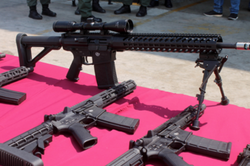 The Stockholm International Peace Research Institute (SIPRI) has found that arms sales to the Middle East have grown by 87 percent over the past five years, with Saudi Arabia topping the list of importers.
The Stockholm International Peace Research Institute (SIPRI) has found that arms sales to the Middle East have grown by 87 percent over the past five years, with Saudi Arabia topping the list of importers. RNA - The SIPRI said in a report on Sunday that Saudi Arabia’s arms imports in 2014-2018 increased by 192 percent, compared to the preceding five years, becoming the world’s top arms importer.
Other countries at the top of the list of global arms buyers included Egypt, Algeria, the United Arab Emirates and Iraq. The institute measures the volume of deliveries of arms, not the dollar value of deals.
According to the report, arms sales to the Middle East now account for more than a third of the global trade.
The defense think-tank’s annual survey also showed how the United States and European countries sell jets, jeeps and other gear used in controversial wars in Yemen and beyond, Pieter Wezeman, a senior researcher with SIPRI, told Middle East Eye.
“Weapons from the US, the UK and France are in high demand in the Persian Gulf, where conflicts and tensions are rife. Russia, France and Germany dramatically increased their arms sales to Egypt in the past five years,” he said.
Wezeman attributed the growth in Middle Eastern imports to the need to replace military gear that was deployed and destroyed in Yemen, Syria, Iraq and Libya, as well as political tensions and a regional arms race.
“The UAE, Saudi Arabia and Israel are readying for a potential conflict with Iran,” the 12-page report said. The report also referred to a severe diplomatic crisis between Qatar and a Saudi-led quartet of states.
The survey also found that the US remains the world’s top arms seller, with a 29 percent jump in its exports over the past five years. Over half of the US arms (52 percent) were sold to customers in the Middle East.
British sales rose by 5.9 percent over the same period. Most of the UK arms exports (59 percent) also went to Middle Eastern countries, with Saudi Arabia and Oman being the main destinations for its combat aircraft.
Patrick Wilcken, an arms control specialist with the UK-based watchdog Amnesty International, decried the “hypocrisy” of Western governments not following their own rules by continuing to supply authoritarian regimes that commit wartime abuses or violations against their own people.
He noted that Western arms more often end up being used in human rights abuses, referring to Egypt’s crackdown on political dissidents, Israel’s occupation of Palestinian land and the Saudi-led aggression against Yemen.
“In Yemen, totally unaccountable militias are being armed and supported by the UAE and Saudi Arabia, which is setting the scene for a future period of instability and human rights violations,” he added.
Last month, the Trump administration threatened to veto a bid by the United States Congress to end the country’s military support for the Saudi Arabia-led coalition's onslaught in Yemen.
In Britain, the House of Lords International Relations Committee concluded that UK arms sales to Saudi Arabia since the start of the Riyadh-led war on Yemen have been causing “significant civilian casualties” in the country.
Germany alone has taken a stand. Last week it extended until the end of March a ban on arms exports to Saudi Arabia imposed over the kingdom’s deadly campaign against Yemen and the murder of dissident journalist Jamal Khashoggi.
Germany’s decision to halt arms sales to the kingdom has drawn criticism of European partners, including France and Britain, due to the fact that the move has impacted joint military projects.
Jeff Abramson, a scholar at the Arms Control Association, said Washington should follow Germany’s example.
“Instead of being challenged, the US continues to claim a larger share of an expanding global arms market,” Abramson said.
“As such, the US should take the lead in promoting responsible behavior, rather than encouraging trade to repressive and irresponsible regimes, such as those in Saudi Arabia and the UAE.”
847/940